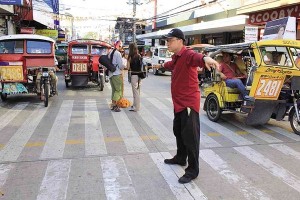
ENVIRONMENTAL lawyer Antonio Oposa delineates the boundaries for vehicles and pedestrians during a road sharing experiment in the busy Perdices Street in downtown Dumaguete City. HERSLEY VEN CASERO/CONTRIBUTOR
DUMAGUETE CITY—Does anyone have a P500 bill?” Antonio Oposa Jr., a renowned environmental lawyer, asked the audience last month in the James Herring Audio Visual Room at Foundation University in Dumaguete City, Negros Oriental.
After someone waved a crisp bill in the air, Oposa reached out for it and asked: “Now, does anyone have a match?” Nervous giggles erupted.
A student did produce a match, and Oposa ordered him to burn the P500 bill. As the people anxiously watched on the edge of their seats, the match was lit and placed under the currency. Oposa suddenly reached out and grabbed the money, to everyone’s relief.
The lesson was delivered.
“You all felt uneasy about the idea of burning the P500 bill,” Oposa said, “yet whenever we drive a car, that’s what we do—we burn money!”
In a typical classroom-style discussion, the law professor, a 2009 Ramon Magsaysay awardee, asked a student to stand and read the captions to drawings of a bicycle and a car flashed onscreen.
“This,” the reader of the bike caption said, “runs on fat and saves you money.” And the caption to the car drawing: “This runs on money and makes you fat.”
Walking
Oposa said it was not necessary to ride a car or a four-wheeled vehicle to get from point A to point B. “One can walk or take a bike, but the problem is that there is nowhere to walk because the sidewalks are uneven and sometimes being used as parking spaces,” he said.
Only 2 percent of the population own cars but they own 98 percent of the road, he claimed. “The 98 percent of the population who don’t own cars are relegated to only 2 percent of the road.”
His statement made the audience, especially the bikers, runners and environmentalists, nod in approval.
Oposa is recommending a revolutionary step to start a paradigm shift—road sharing.
To stress his point, Oposa went to the busy Perdices Street in Dumaguete. With a rope, he divided the street into two lanes—one for cars, tricycles and motorcycles, which reduced traffic to a crawl, and the other for pedestrians, runners and cyclists.
The activity lasted for some 30 minutes but it was met with criticisms online from netizens who thought it was another traffic experiment conducted by the city, due to the presence of personnel from the Traffic Management Office. The bad reviews ended when project proponents and backers went online to explain the concept of road sharing.
Movement for change
Foundation University, which gave Oposa an honorary Doctor of Humanities degree in 2011, gave its full backing to his program by sponsoring the activity.
“We’re happy to be part of the movement for positive change in Dumaguete,” said Dr. Mira Sinco, university president.
Oposa said vegetables could even be planted on shared roads.
To prove his point, he planted “malunggay” (moringa) in the middle of a private road in Barangay Bagacay, a riverside village in Dumaguete. He also led the planting of vegetables and root crops in the riverbank beside the road.
“We have to teach our children to share. These vegetables will be for everyone,” he said.
Volunteer proponents of the road sharing movement from Pasig and Cebu cities joined in the activity and helped explain to barangay residents what the movement was all about.
The concept of road sharing, Oposa explained, is not a request addressed to local government units but a legal petition using the power of the people to propose an ordinance called people’s initiative. This law says a minimum of 50 voters can sign a proposal to the barangay, which has 30 days to approve it.
If the barangay does not approve it, the petitioners can ask for a referendum in the Commission on Elections.
“The people’s initiative has never been tested beyond the recall proceedings for elected local officials,” Oposa said.
Backing this initiative is Executive Order No. 774, series of 2008, which tasks the Department of Transportation and Communications with transforming the transportation sector.
Simple principle
“The new paradigm in the movement of men and things must follow a simple principle: Those who have less in wheels should have more in road,” Oposa said.
Cars may be a good thing to have, especially if one travels long distances, he said, but people don’t really need cars in a small city like Dumaguete, where one can walk from one side of town to the other in a matter of minutes.
To achieve this, he said the local government units should make walking a pleasant experience by planting trees for shade and by providing lanes for bicycles and pedestrians.
Having too many vehicles on the road can lead to traffic congestion, which brought losses to the Philippines in human productivity amounting to P137 billion in 2011 alone, Oposa said.
“We live in the richest and most beautiful country on earth, but we have been swamped by the tsunami of Western influences,” the environmentalist said.
The movement for road sharing is also being felt in cities like Cebu, Iloilo and Pasig.
Ever pressing forward, Oposa said the time for talk was over. “Awareness is good, but awareness without action is like a bow without an arrow. Useless each without the other.”